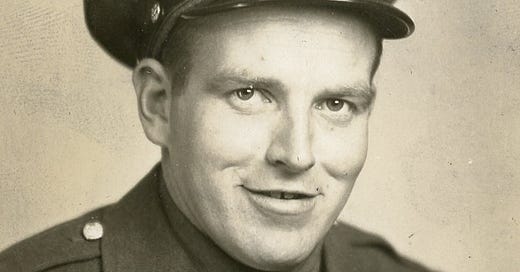FINNS: An Oral History of Finnish-Americans in New Hampshire’s Monadnock Region
Excerpted from FINNS: An Oral History... by Patricia Kangas Ktistes, 1997, all rights reserved.
Leo Hill
Ralph Kangas and Bruno Maki went to Worcester to enlist in the Navy. I told them, “I don’t want no part of the Navy. I can’t swim and I can’t walk on water.” If I was going to get in, the Navy said I had to have a couple of teeth fixed. So I told them, “If they don’t want to fix my teeth, forget it.” I was working at Simonds.: Ray Richardson was an executive there. I showed him my draft card. It said, ‘GREETINGS!’ And Ray said, “You wanna stay? Would you like to have me try to get you a deferment?” I said, “Okay.” So he wrote a letter saying that I was a good saw filer. I had worked in the woods all the time. That was war-time crosscuts. Then about nine months later, the draft board called me up again. Ray said, “You want to try again?” Everybody else was gone by then, so I told him, “Nope.” Milton Burton, a guy I went to high school with, used to walk down the streets and get madderevery day. Some woman would always stop and ask him, “How come you’re not in the service?” I went into the service when I was around 27 years old. My brother-in-law was working at Fort Devens. He said to me, “Whatever you do, don’t get put into the infantry.” But when I walked into Camp Adabury, Indiana, I found that the infantry was where I was assigned.
Once Patton took us out; this could have been at Murphysboro or somewhere. He comes up with white gloves. White leggings. Pistol: all white or something. Then he’d get out there, everyone from the rank of staff sergeants and up. First sergeants, lieutenants. On the hillside. “Oh, what a wonderful-looking buncha guys!” And he could swear. Every other word. He says, “There’s 90,000 whatchamacallits of them over there that are dead or they’ve surrendered to the United States. And it ain’t gonna happen to you. When you go back home, you can tell the folks that you wasn’t shoveling horse manure on The Island (England.)”. We went to England, then landed at Omaha Beach. Ernie Pyle, the news reporter, he’s the guy that got us over there. We had been in training a heck of a long time. At Camp Breckenridge and Camp Adabury, then we went to maneuvers in Kentucky. We had a good record. So Pyle wrote an article, I think in The Stars and Stripes that said, “What’s that crack outfit doing in the cornfields?” And the next day we were on a boat. Ten days after the invasion, ‘D plus 10,’ was when I was at Omaha Beach. Guys were still floating around in these lifesaving things; you could see them going by, dead, once in a while. We were in the 83rd Infantry Division under the Commander of Blood and Guts: Patton. “What a fine lookin’ bunch of fellas!” When you’d go out on night patrol, they’d blacken up your faces and everything. And when the German had to go to the toilet, he didn’t bury it. The United States guys, they had to take a little shovel in their pack, a pickmatic, an amateur thing you can dig a hole with. “And whether you’re in the foxhole or not, don’t just go on the ground. ‘Cause your buddy’s coming along.” I was going on patrol one time in the dark and had to hit the ground all of a sudden: stink! Because the Germans didn’t have shovels. But you didn’t dare move when you hit the ground. We started the attack on July the first. On July the fourth I got hit. The bodies were so thick where I got wounded, you couldn’t step on the ground. If you wanted to move along, you had to step on the bodies.
I was in the hospital almost two years. I went to so many hospitals, it was unbelievable. In 1945 at one hospital, there were two of us in wheelchairs. The other boys are all going home: they named all of the guys’ names returning to Fort Devens. They never said “Hill” and whatever the other name was of the other guy in the wheelchair. So this guy and I chased the night nurse to find out why we weren’t on the list of guys going to Devens. She said, “I’m going to tell you, but I’m not supposed to. You two are going to fly.” We said, “We ain’t going to say nothing, don’t worry.” So we flew home in a plane. The other guy had a knee injury: floating condyle, I always remembered that.
I never saw another Finn when I was in the service. But a family from Greenville lost all those sons: the Delay brothers. One used to drive a truck for Brockelman’s: a store in Fitchburg. His name was Johnny Delay. They put four or five of them on one ship and I think they all got killed.




Wherever the photo of Leo came from, thanks for including it. While interviewing he also was planning to make a pot roast. Good old Leo.